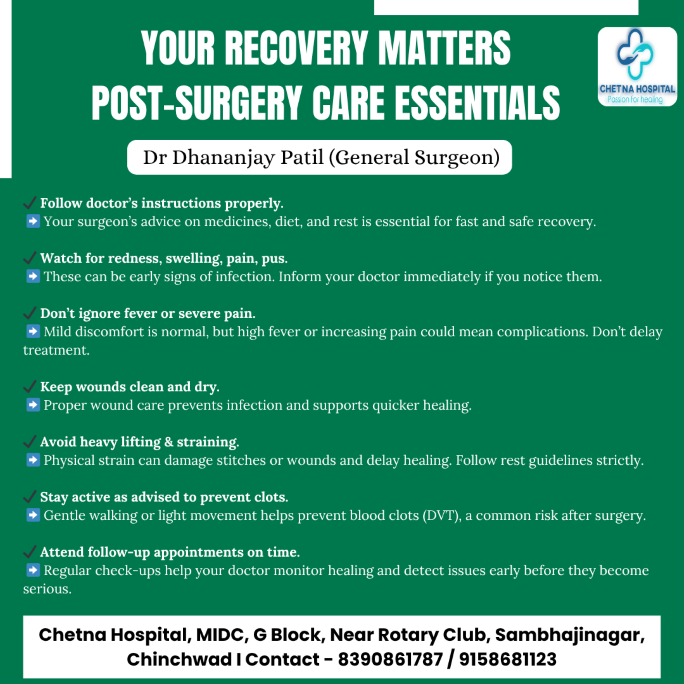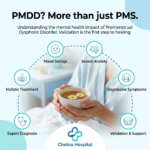Surgery marks a turning point in a patient’s health journey. Whether it’s a small procedure like removing a cyst or a major operation such as hernia repair or gallbladder removal, surgery brings hope for recovery, relief, and a better quality of life. However, what happens after the surgery is equally important as the procedure itself. Proper post-surgical care and awareness about possible complications are essential to ensure a smooth recovery without setbacks.
Many people wrongly assume that once the operation is over, their responsibility ends. This misunderstanding often leads to preventable complications such as infections, delayed healing, and hospital readmissions. This blog aims to create awareness about the importance of post-operative care, common complications, their signs, and how to avoid them.
Why Post-Surgical Care Matters
Your surgeon completes the technical part of the treatment inside the operation theatre, but healing truly begins after you leave the hospital. The body needs time, rest, proper care, and monitoring to recover fully. Neglecting post-surgical care can lead to serious health issues, increase treatment costs, prolong recovery time, and in severe cases, lead to life-threatening complications.
Following your surgeon’s advice and understanding the risks associated with poor post-surgical care help prevent complications and ensure optimal healing.
Common Post-Surgical Complications You Should Be Aware Of
Here are the most common complications patients face if proper care is not taken after surgery:
1️⃣ Wound Infection
One of the most frequent post-surgical issues is wound infection. Symptoms include:
- Redness or warmth around the wound
- Swelling or increased pain
- Pus discharge
- Foul smell from the wound
- Fever
If untreated, infections can spread and delay recovery or require further surgeries.
2️⃣ Delayed Wound Healing
Certain factors can slow down the natural healing process:
- Diabetes
- Smoking
- Obesity
- Poor nutrition
- Neglecting wound care instructions
Delayed healing can increase the risk of infection and scar formation.
3️⃣ Deep Vein Thrombosis (DVT)
After surgery, especially major surgeries, patients are at risk of blood clots forming in the legs. These clots can travel to the lungs, causing a pulmonary embolism, a potentially fatal complication.
Signs to watch for:
- Leg pain or swelling
- Redness or warmth in the leg
- Difficulty breathing (if clots travel to lungs)
Light movement or short walks after surgery can prevent this risk.
4️⃣ Fever or Sepsis
While mild fever is common after surgery, a persistent high fever could signal infection. Sepsis, a life-threatening reaction to infection, can occur if infections are ignored.
5️⃣ Post-Surgical Constipation
Pain medications and reduced mobility after surgery often cause constipation, which can lead to discomfort and further strain healing areas, especially after abdominal surgery.
6️⃣ Respiratory Complications
Patients who do not follow breathing exercises or physiotherapy advice after surgery may develop lung infections like pneumonia. This is especially true for elderly patients or those undergoing chest/abdominal procedures.
Early Signs of Complications You Should Not Ignore
Recognizing symptoms early is critical in preventing minor issues from becoming major health problems. Contact your doctor immediately if you experience:
- Increased pain at the surgical site
- Redness, swelling, or pus discharge
- Continuous fever or chills
- Difficulty breathing or chest pain
- Leg swelling or pain
- Persistent vomiting or diarrhea
- Dizziness or fainting
Golden Rules for Safe Post-Surgical Recovery
✅ Follow Doctor’s Instructions Properly
Your surgeon’s guidelines regarding rest, medications, diet, wound care, and activity restrictions are specifically tailored to your surgery. Ignoring them can reverse your progress.
✅ Attend Follow-Up Appointments
Even if you feel fine, follow-up visits help your surgeon monitor healing, remove stitches if needed, and detect silent complications early.
✅ Keep the Wound Clean & Dry
Proper wound care is crucial to prevent infections. Change dressings as advised and avoid exposing wounds to water unless permitted.
✅ Avoid Heavy Lifting & Straining
Lifting heavy objects can reopen internal wounds, cause hernias, or delay healing. Strictly follow lifting restrictions.
✅ Maintain a Healthy Diet
A balanced diet rich in protein, vitamins, and minerals speeds up healing. Hydration is equally important for preventing constipation and promoting recovery.
✅ Stay Active (As Advised)
Light movement helps prevent blood clots and maintains overall health. However, over-exertion can delay healing. Follow your doctor’s guidance.
✅ Manage Pain Responsibly
Pain is normal after surgery, but unbearable or increasing pain is not. Take medications as prescribed and report abnormal pain promptly.
✅ Monitor for Constipation
Prevent constipation through fiber-rich foods, hydration, and mild laxatives if advised. Straining can worsen surgical wounds.
For Consultation Contact us on 8390861787 / 9158681123
Website – www.chetnahospital.co.in
Address – Chetna Hospital, Sambhajinagar, MIDC, G Block, Near Rotary Club, Chinchwad 411019
.
.
.
#pune#pcmc#chinchwad#hospital#medical#medicalservices#health#healthcare#surgery#generalsurgery#medicalprocedure#generalsurgeon#generalsurgeoninchinchwad













